 The pinnacle experience of my life was going to hell when I was 20. I’ve shied away from talking about it over the years because it was so unspeakable. But perhaps I shouldn’t.
The pinnacle experience of my life was going to hell when I was 20. I’ve shied away from talking about it over the years because it was so unspeakable. But perhaps I shouldn’t.
Near-death experiences are rare and ones where the experience is a horrific one seem to be even more rare. But that’s what happened to me.
Many scoff at the idea of hell. I smile when I see things like that. Through that experience, I was delivered from severely entrenched atheism. Back then, I was an “evangelist” of atheism; I found joy in defeating weak, vacillating Christians in debate. But entering the spiritual world, utterly naked and without any protective covering that salvation in Christ gives, I experienced the full onslaught of the afterlife outside salvation.
I don’t know if I’ve ever really described that experience. Perhaps I should. You may not be able to relate to it, it may seem like gibberish to you. But life after death for someone without salvation in Jesus is going to be a very, extremely, strange world, as it was for me.
 Without salvation in the afterlife, I was like a person without diving equipment, 150 meters (yards) below sea level. There was no oxygen. It was a strange, foreign world. There were beings there that were in their realm while I was not in mine. I was in extreme panic and in great confusion.
Without salvation in the afterlife, I was like a person without diving equipment, 150 meters (yards) below sea level. There was no oxygen. It was a strange, foreign world. There were beings there that were in their realm while I was not in mine. I was in extreme panic and in great confusion.
But worst of all, there was no way back. It was too late. The level of fear, confusion, despondency and utter hopelessness defies explanation in words we have in our present realm.
It’s an incredible thing to enter the spiritual world. One thing I saw so clearly is that it’s really “all by faith’. We say that glibly here in our realm. But in the spiritual world, faith is utterly the coinage of the realm. And I endlessly gasped for even a whiff of faith.
Everything there was inside out, compared to this present world we live in. Materially things there are completely secondary, if they register at all. Elements of the soul and heart are the substance of that realm and your spiritual condition is the only thing that matters.
Jesus talked about the man who came to the wedding feast without a wedding garment. (Matthew 22:12) That’s how I was. I didn’t have the garment of salvation, the transformation that makes life in eternity possible. So I was utterly unprepared to experience the spiritual world.
Did I understand all that then at that time, as I somewhat do now? No; really, really I didn’t. I was in a prolonged terror, experiencing things that I totally didn’t understand and didn’t even have words to describe what was happening to me. I had virtually no understanding of what I was experiencing or the words to describe it , which I came to find after becoming a believing Christian and reading the explanation of life that the Bible gives.
Time, as we experience it here, ceased to exist there. I was in eternity. But also in utter confusion, utter hopelessness, utter lack of truth. I do believe that this is within the element and range of what the unsaved experience in the hereafter, in hell.

The apostle Paul talked about, “Knowing therefore the terror of the Lord…” (II Corinthians 5:11). No, Paul was not in hell in Acts 9 but he was suddenly face to face with the Lord, who told Paul, “I am Jesus who you persecute.” Paul was utterly on the wrong side of the Lord and that was his introduction.
You don’t find many preachers talking about Paul talking about “knowing the terror of the Lord.” Talking about hell in these times is very passé. It’s just not done. It’s not cool.
Be that as it may, I feel I should speak up more about how that is what I experienced. For me, it was totally what I needed to stun, shock and sear me out of my unbelief. Nobody could talk to me. I was always the smartest guy in the room, at least in my own eyes. So the Lord let this happen, in His mercy, so that I could get a real glimpse of how very far away from the truth I was.
 And truth was actually what I’d been looking for all along. So God gave me this experience, outside any contact with others, not a pastor, not my grandparents, not a church, but just me alone. And it worked.
And truth was actually what I’d been looking for all along. So God gave me this experience, outside any contact with others, not a pastor, not my grandparents, not a church, but just me alone. And it worked.
I was so stunned, shocked and almost in unbelief that I was able to return to this realm where we all now live, after experiencing so horrific a place, that it was like some kind of Sci-Fi movie where someone comes back to this earth and world, after a prolonged absence. That might sound like I’m exaggerating, but I’m not.
If this is just outside your realm of understanding, I can give you the text to two songs that rather well articulate the atmosphere of Hell. The Eagles wrote in the last words of “Hotel California”, “You can check-out any time you like, but you can never leave!” That’s how hell works: you can never leave.
 Similarly, Bob Dylan sang in one of his songs, “There must be some kind of way outta here, said the joker to the thief, there’s too much confusion, I can’t get no relief.” As the song says, you look for a way out but it eludes you. Meanwhile, confusion engulfs and consumes you. Snippets and dark glimpses of hell, brought into contemporary music.
Similarly, Bob Dylan sang in one of his songs, “There must be some kind of way outta here, said the joker to the thief, there’s too much confusion, I can’t get no relief.” As the song says, you look for a way out but it eludes you. Meanwhile, confusion engulfs and consumes you. Snippets and dark glimpses of hell, brought into contemporary music.
I’ve been happily encouraged through the years when I’ve read of others who’ve had near-death experiences, that they too have had very similar feelings to mine. They don’t even want to talk about it. They don’t think anyone will believe them. They struggle strongly even to find the words to describe what happened to them. It’s a very personal thing that often their friends and family can’t believe and it makes them estranged from their loved ones, since it all seems so farfetched.
I’m glad I’ve been able to put this on paper, so to speak. Experiencing hell was what it took to lay a foundational event in my life that prepared me to receive the message of salvation from young “Jesus People” a few months later. And it was this experience, that the spiritual world is fundamentally the real world, that made the decision to follow Jesus and to take up my cross in service to Him to be the only “common sense” thing that I knew was the high will of God.
This was all when I was in my early 20’s, long ago. But looking back, I see again how pivotal that experience I had in the spiritual world was, even if it was in the dark side of it. I was there, thrust there by God, because of my hardness of heart and repeated resistance to the Holy Spirit which was trying to reach out to me.
I hope this is somehow a blessing to someone. The spiritual world is real. Unbelief and atheism are your worst enemies, at least they were mine. There is no depth that God in His mercy cannot reach to find us in our worst condition and to lead us back out of that blackness, even virtual insanity, back to the glorious light that is in Him.
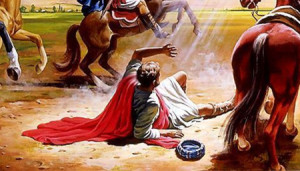

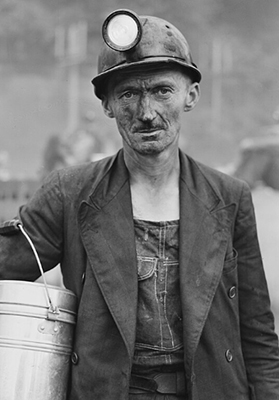
 Bonded labor in that form no longer exists here in the United States, as far as I know. But severe poverty, often driven by heartless mercantilism, has been a reality for people throughout history. John Steinbeck’s The Grapes of Wrath, written in 1939, was a blistering critique of the conditions farm workers faced in California at the time—working for 25 cents a day, barely staying ahead of starvation.
Bonded labor in that form no longer exists here in the United States, as far as I know. But severe poverty, often driven by heartless mercantilism, has been a reality for people throughout history. John Steinbeck’s The Grapes of Wrath, written in 1939, was a blistering critique of the conditions farm workers faced in California at the time—working for 25 cents a day, barely staying ahead of starvation.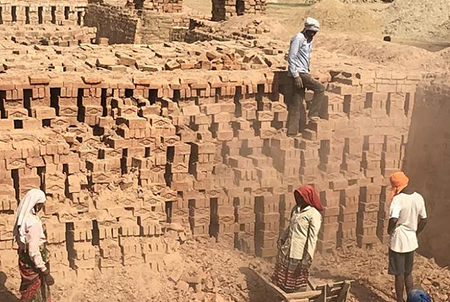 So, what can I do? What do I plan to do? First, I can write this and share it with you, my friends. I can ask for your prayers—not only for me, but especially for this exploited man and his young family. You don’t need to know his name or his country to lift him in prayer.
So, what can I do? What do I plan to do? First, I can write this and share it with you, my friends. I can ask for your prayers—not only for me, but especially for this exploited man and his young family. You don’t need to know his name or his country to lift him in prayer.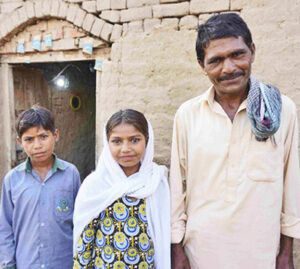 But I can still help this man and his family. I’m sure not rich but I do have enough to try at least to buy this man out of utter literal slavery and into some form of labor that will lift them up to a more endurable daily existence.
But I can still help this man and his family. I’m sure not rich but I do have enough to try at least to buy this man out of utter literal slavery and into some form of labor that will lift them up to a more endurable daily existence.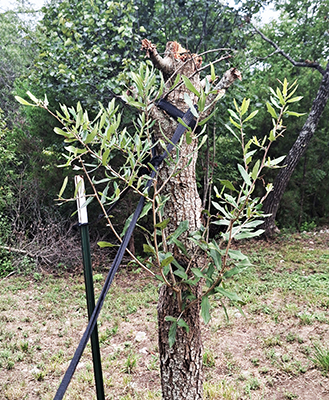
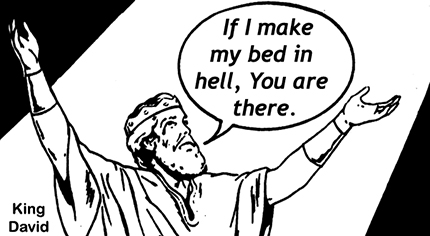 But I’m convinced there’s often more going on than what we see. King David wrote to God, “
But I’m convinced there’s often more going on than what we see. King David wrote to God, “ I believe He can do the same with people. Scripture is full of stories of those who were spiritually—and sometimes even physically—dead, yet returned to life through God’s mercy. The prodigal son was, for all intents and purposes, dead to the life he once had. But when “
I believe He can do the same with people. Scripture is full of stories of those who were spiritually—and sometimes even physically—dead, yet returned to life through God’s mercy. The prodigal son was, for all intents and purposes, dead to the life he once had. But when “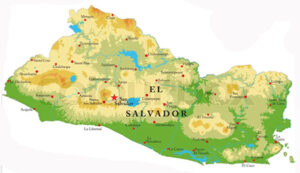
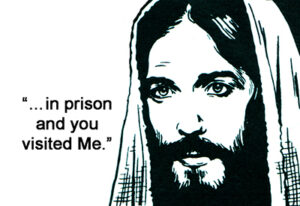 They strongly call us to something higher than the present putrid stench of politics that too often drags us down to the worst in humanity, no matter our race, nationality, or status.
They strongly call us to something higher than the present putrid stench of politics that too often drags us down to the worst in humanity, no matter our race, nationality, or status.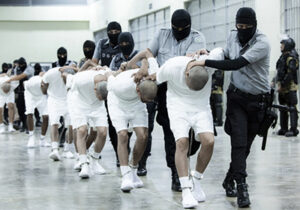 nstead, He continues to guide and prod us along towards worthy actions that we can take to be like the woman Jesus referred to, “
nstead, He continues to guide and prod us along towards worthy actions that we can take to be like the woman Jesus referred to, “
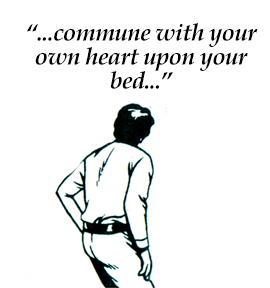 But the real kicker came later this morning, after my daily devotion time, when I went out for a little prayer. A verse came to mind, “
But the real kicker came later this morning, after my daily devotion time, when I went out for a little prayer. A verse came to mind, “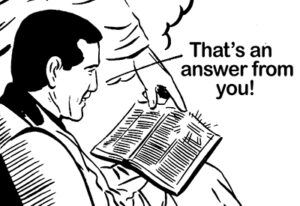 And then there was more. When I went back inside to add that verse to my memory system, my eyes landed directly on Psalm 4:4—already written on one of my memory cards. I had evidently memorized it some time ago. But today, the Lord led me to look directly on it as I was going through my memory system, bringing it back a second time in such a personal, unmistakable way.
And then there was more. When I went back inside to add that verse to my memory system, my eyes landed directly on Psalm 4:4—already written on one of my memory cards. I had evidently memorized it some time ago. But today, the Lord led me to look directly on it as I was going through my memory system, bringing it back a second time in such a personal, unmistakable way.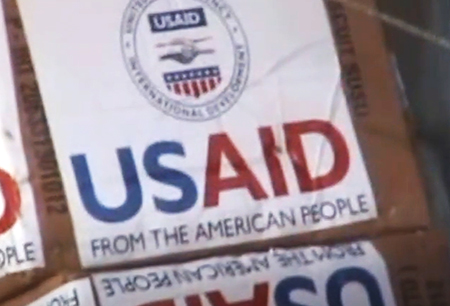
 Suddenly, there was a flurry of excitement as people pointed to the sky. A large helicopter, with no markings, began circling low over the camp. It then landed about 100 yards away and began unloading boxes. In the video, you can see dozens of Acehnese people, along with a tall Texan friend of mine, rushing toward the helicopter to investigate.
Suddenly, there was a flurry of excitement as people pointed to the sky. A large helicopter, with no markings, began circling low over the camp. It then landed about 100 yards away and began unloading boxes. In the video, you can see dozens of Acehnese people, along with a tall Texan friend of mine, rushing toward the helicopter to investigate. I assume the US forces wanted to avoid being identified or misunderstood in their motives. However, the aid boxes were clearly marked with “USAID,” making it evident that the US military and government were working to alleviate the suffering of the people.
I assume the US forces wanted to avoid being identified or misunderstood in their motives. However, the aid boxes were clearly marked with “USAID,” making it evident that the US military and government were working to alleviate the suffering of the people.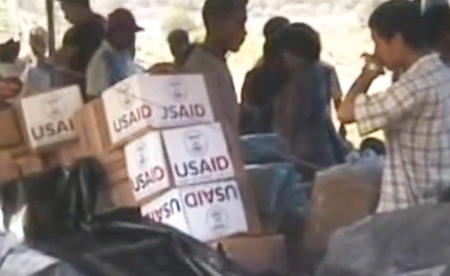 This morning, as I thought about the current controversy surrounding USAID in the United States, those memories came flooding back. There’s a massive shake-up underway in Washington. And while I believe much of it is necessary, I also find it personally relevant, given my own experiences abroad as a Christian aid worker, often in refugee camps and orphanages.
This morning, as I thought about the current controversy surrounding USAID in the United States, those memories came flooding back. There’s a massive shake-up underway in Washington. And while I believe much of it is necessary, I also find it personally relevant, given my own experiences abroad as a Christian aid worker, often in refugee camps and orphanages.
 since
since 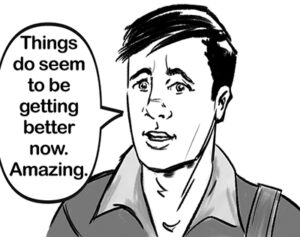 But eclipses don’t last forever. Mine didn’t. Perhaps a secret for me was that I knew God and His son Jesus. And They are able to deliver us from the lowest hell. It was that faith, that God was bigger than my circumstances, that gave me the grace to just hold on and keep praying through a time like I’d never gone through before.
But eclipses don’t last forever. Mine didn’t. Perhaps a secret for me was that I knew God and His son Jesus. And They are able to deliver us from the lowest hell. It was that faith, that God was bigger than my circumstances, that gave me the grace to just hold on and keep praying through a time like I’d never gone through before.
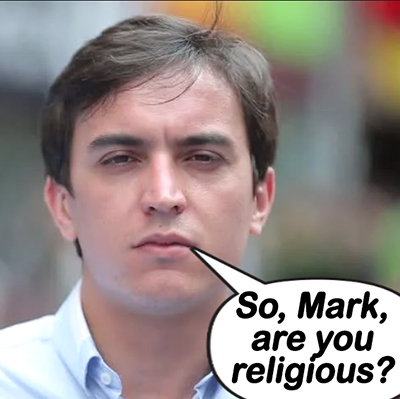 “So, Mark, are you religious? Do you think that religion will solve the problems of the world today?”
“So, Mark, are you religious? Do you think that religion will solve the problems of the world today?”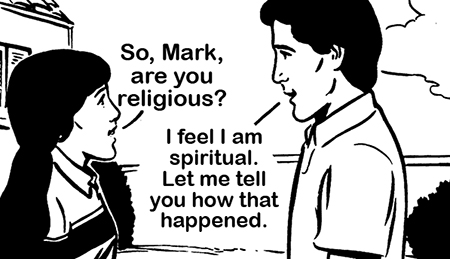 I can see how that question asked by someone else, seeking to understand me better and what I stand for, might have said the same thing. In that case, it would be easy to hear the sincerity in their voice and in that situation I would have answered completely differently.
I can see how that question asked by someone else, seeking to understand me better and what I stand for, might have said the same thing. In that case, it would be easy to hear the sincerity in their voice and in that situation I would have answered completely differently.
 Without salvation in the afterlife, I was like a person without diving equipment, 150 meters (yards) below sea level. There was no oxygen. It was a strange, foreign world. There were beings there that were in their realm while I was not in mine. I was in extreme panic and in great confusion.
Without salvation in the afterlife, I was like a person without diving equipment, 150 meters (yards) below sea level. There was no oxygen. It was a strange, foreign world. There were beings there that were in their realm while I was not in mine. I was in extreme panic and in great confusion.
 And truth was actually what I’d been looking for all along. So God gave me this experience, outside any contact with others, not a pastor, not my grandparents, not a church, but just me alone. And it worked.
And truth was actually what I’d been looking for all along. So God gave me this experience, outside any contact with others, not a pastor, not my grandparents, not a church, but just me alone. And it worked. Similarly, Bob Dylan sang in one of his songs, “There must be some kind of way outta here, said the joker to the thief, there’s too much confusion, I can’t get no relief.” As the song says, you look for a way out but it eludes you. Meanwhile, confusion engulfs and consumes you. Snippets and dark glimpses of hell, brought into contemporary music.
Similarly, Bob Dylan sang in one of his songs, “There must be some kind of way outta here, said the joker to the thief, there’s too much confusion, I can’t get no relief.” As the song says, you look for a way out but it eludes you. Meanwhile, confusion engulfs and consumes you. Snippets and dark glimpses of hell, brought into contemporary music.